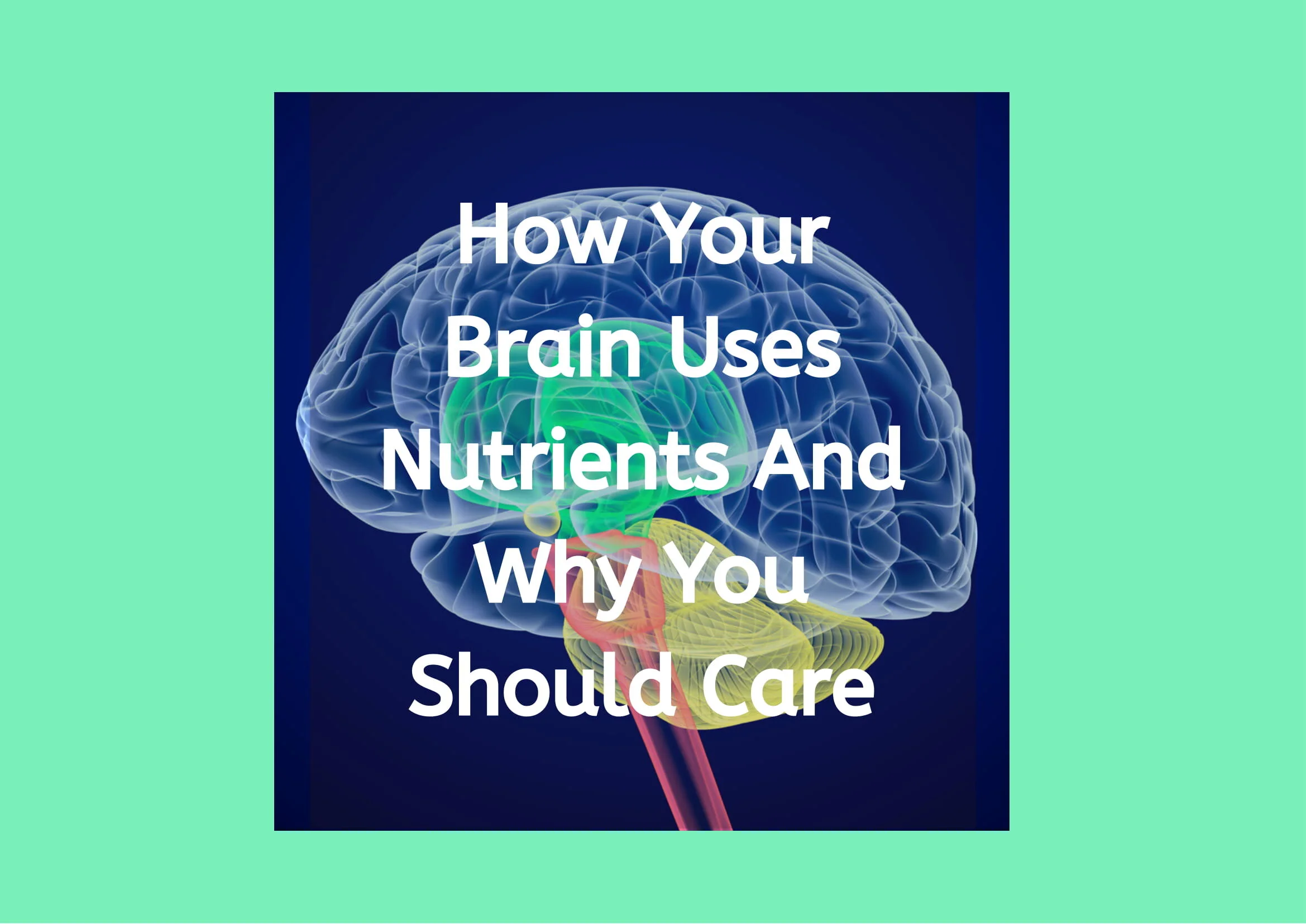How Your Brain Uses Nutrients And Why You Should Care
Many people are now more aware that what we eat, and how well our gut digests, and absorbs food, and eliminates waste, does impact brain function.
However, many people may not be aware of exactly how food impacts their brain, or why deficiencies negatively impact brain development and function.
And, they may be surprised to discover that food choices, and therefore nutrient intake, impacts how the brain ages.
Energy co-factors
At only 2% of our body weight and using upwards of 25% of the carbohydrates we consume, the brain is the most energy-demanding organ we own.
We have 160,000 km of blood vessels in the body, and about 650 km in the brain, and they’re kept busy ferrying oxygen and blood (which transports nutrients) to each of our 83+ billion neurons.
B vitamins specifically are co-enzymes, required inside mitochondria for the conversion of carbohydrates (glucose) into adenosine triphosphate (ATP), the energy currency of all cells, including our greedy neurons.
Specific B vitamins are also used to synthesise fatty acids, neuronal messengers (neurotransmitters), and specific proteins, and others are used to ensure neuronal membrane integrity.
A lack of B vitamins also leads to an increase in homocysteine, a potentially toxic amino acid, linked to cognitive decline.
Other nutrients such as Vitamin C, D and E are also involved in energy production, as are Magnesium, Manganese, Selenium, Zinc and Omega fatty acids.
Research suggests that a sizeable proportion of the population in developed countries are deficient in one or more B vitamins, as well as other nutrients, and the optimal level of any nutrient has yet to receive any attention.
Furthermore, the brain has nowhere to store energy, so a consistent, stable supply of energy is critical, which means nutrients need to be available consistently too.
In the process of producing energy, mitochondria also produce free-radicals, which have the potential to cause damage to brain tissue. Anti-oxidant nutrients, (such as vitamin C and E), counter free-radical damage, and prevent an inflammatory cascade that can cause significant structural damage.
When we’re deficient in any of these nutrients we end up feeling tired physically, but our brain feels any deficiency most of all, as it’s our primary survival organ.
Over time, these deficiencies cause mitochondrial and neuronal damage, which extends outwards to other neural tissue, and contributes to cognitive decline.
Neurotransmitters
Neurotransmitters are special compounds/chemicals that neurons use to communicate with each other, using electricity.
Nutrients, in the form of amino acids, combined with vitamins and minerals, are the building blocks of neuronal messengers, called neurotransmitters.
Amino acids, B vitamins, vitamin C, and minerals such as iron, magnesium and zinc are all involved, in differing quantities, in the synthesis of neurotransmitters.
When we’re deficient in specific nutrients, we can’t synthesise enough neurotransmitters, which hampers neuronal communication.
This sets off a negative chain-reaction, which leads to poor mood, focus, concentration and memory, which most people ignore as being due to something other than being deficient in specific nutrients.
Unfortunately, these symptoms are also a precursor to cognitive decline, and more severe mood disorders.
Brain Structure
The brain is a squishy, watery, and fatty organ, which feels like jelly. It’s made up of fat, water and protein, and fats have a critical role to play in how effectively it works.
Fats make up 60% of the dry weight of the brain, and of that, 22-25% need to be polyunsaturated fats, Omega 3 and Omega 6.
Yes, we need both of these essential fatty acids (EFAs) for our brain to both develop, and function, optimally.
Structure always impacts function. Even minor structural shifts in relation to fat type in neuronal membranes have long-reaching effects.
Communication in the brain occurs across synapses, which are very fat-dense parts of neurons that neurotransmitters jump from to gain access to their neighbouring neurons.
Synapses are also involved in synthesising the neurotransmitters that jump from within these fatty, specialised areas.
Furthermore, the electrochemical impulses that drive neurotransmitters to jump across synapses, move through a heavily fat-insulated (myelinated) cable, called an axon.
If myelination is compromised due to a lack of the right fats, communication is hampered.
A lack of the right fats in neural tissue leads to many of the same symptoms as the lack of nutrients required for energy production and neurotransmitter synthesis.
And, also contribute to cognitive decline and increase the risk of inflammation.
Chronic stress
A feeling of stress and overwhelm that continues over a period of days, weeks, months, and in our current situation, even years, is not only an unpleasant experience. It’s also extremely damaging to our delicate brain tissue.
Ongoing stress forces the brain to keep on directing energy, via adrenaline, to our muscles, to fight or flee the tiger.
To synthesise adrenaline, specific nutrients are required, many of which are the same ones as those required to create energy and neurotransmitters.
The brain will always prioritise survival, which is why nutrients will always be directed to survival activities first.
Therefore, chronic stress can lead to deficiencies in nutrients required for other activities, such as neurotransmitter synthesis, resulting in for example, feeling ‘tired but wired’ when trying to fall asleep.
Serotonin synthesis isn’t a priority when adrenaline synthesis is.
Modern stress adds insult to injury, because not only is the stress response constantly activated, the most sophisticated part of the brain, our prefrontal cortex (PFC) is also called on to make sense of the overwhelm and confusion that seems to accompany modern life.
The PFC uses 20% of the total energy that the brain uses, making it the most energy demanding part of the human brain.
Decision-fatigue is therefore real, because the sophistication that underpins PFC activity cannot be sustained for long periods of time and requires both nutritional replenishment and sleep to recover and perform optimally again.
Unfortunately, chronic stress also impacts the way energy is produced in the body and brain, which leads to metabolic challenges.
Ongoing stress also influences our choice of foods, which naturally gravitate to highly processed and nutrient-deficient foods when we are very stressed.
And the quality of our sleep is also compromised by chronic stress.
Combined, these negative effects impact brain function on a different level, separate to the nurient cost of stress.
Adding insult to injury, mood disorders like anxiety and depression are also linked to chronic stress, due to structural changes that occur in neural tissue in the presence of these affective disorders.
In summary, you now know that nutrients have a number of critical roles to play in brain function and structure, and therefore mental health.
Only a few dietary supplements have evidence to support their use for overall health, and specifically brain health and stress reduction.
Feeding the brain optimally is a complex endeavor, and a handful of blueberries and walnuts, and some fatty fish aren’t capable of doing the job.
With stress levels reaching unprecedented levels, the stakes to get it right have never been higher. In addition, ensuring gut health is optimal also supports brain health. [See other posts on this blog about which foods are supportive of brain health, and both my books, for a detailed explanation of how to address brain nutrition simply with delicious recipes and no deprivation.]
If you want a deep dive into nutrition for brain health check the ‘Become a Lighter Brighter You! in 90 Days’ online course here.
References
Ames BN. Low micronutrient intake may accelerate the degenerative diseases of aging through allocation of scarce micronutrients by triage. Proceedings of the National Academy of Sciences of the United States of America. 2006 Nov 21;103(47):17589-94.
Anderson GH, Johnston JL. Nutrient control of brain neurotransmitter synthesis and function. Canadian Journal of Physiology and Pharmacology. 1983;61(4):271-81.
Bredesen, D. (2017) The End of Alzheimer’s. London: Vermillion Press.
Jacka FN, O'Neil A, Opie R, Itsiopoulos C, Cotton S, Mohebbi M, et al. A randomised controlled trial of dietary improvement for adults with major depression (the 'SMILES' trial). BMC Med. 2017 Jan 30;15(1):23.
Kennedy, DO., B Vitamins and the Brain: Mechanisms, Dose and Efficacy - A Review. 2016. Nutrients. 8:2, 1-29.
Kiecolt-Glaser JK, Fagundes CP, Andridge R, Peng J, Malarkey WB, Habash D, et al. Depression, daily stressors and inflammatory responses to high-fat meals: when stress overrides healthier food choices. Mol Psychiatry. 2017 March;22(3):476-482.
Marcovecchio ML, Chiarelli F. The effects of acute and chronic stress on diabetes control. Science signaling. 2012 Oct 23;5(247):pt10.
Marx W, Moseley G, Berk M, Jacka F. Nutritional psychiatry: the present state of the evidence. Proc Nutr Soc. 2017 Nov;76(4):427-36.
McCabe, D. (2016). Feed Your Brain. 7 Steps to a Lighter, Brighter You! Sydney, Australia: Exisle Publishing.
McEwen, BS., Nasca, C., & Gray, J. D. (2016). Stress Effects on Neuronal Structure: Hippocampus, Amygdala, and Prefrontal Cortex. Neuropsychopharmacology, 41(1), 3-23.
Mergenthaler P, Lindauer U, Dienel GA, Meisel A. Sugar for the brain: the role of glucose in physiological and pathological brain function. Trends Neurosci. 2013;36(10):587-97.
Miller, EK., & Cohen, JD. (2001). An integrative theory of prefrontal cortex function. Annual Review of Neuroscience, 24, 167-202.
Parletta N, Milte CM, Meyer BJ. Nutritional modulation of cognitive function and mental health. J Nutr Biochem. 2013;24(5):725-43.
World Health Organisation. Mental Disorders. Fact Sheet. Geneva: World Health Organisation; 2017 [cited: 2017 April 20]. Available from: http://www.who.int/mediacentre/factsheets/fs369/en/.


